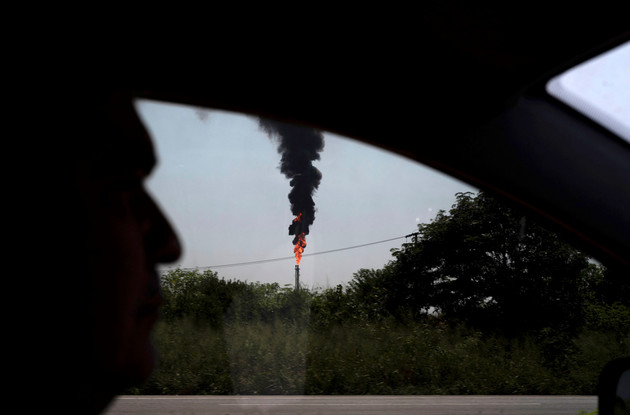
(Politico, 18.Oct.2023) — The Biden administration said Wednesday it will ease sanctions against companies that trade in oil produced in Venezuelan or invest in the South American country’s oil industry in response to its new agreement to allow free elections next year.
The move reverses years of U.S. policy aimed at unseating President Nicolás Maduro — and even before the administration announced it late Wednesday, Republicans were accusing Biden of once again coddling unfriendly oil-producing countries. While the move could help increase the flow of Venezuelan oil into the global crude market, it is not expected to do much to bring down prices that have remained stubbornly high amid turmoil in Europe and the Middle East.
The Treasury Department said the sanctions on exports of crude oil and refined petroleum exports, as well as gold, will be lifted for six months, an expiration date designed to allow the penalties to snap back in place if Maduro reneges on his promise to let independent candidates run in next year’s Venezuelan presidential election and to allow election experts and the international media to monitor it.
“The United States will provide limited sanctions relief primarily in the oil and gas sector in response to this important development,” a senior administration official told a press briefing. “Our ultimate goal with sanctions is to bring positive change in behavior. “The United States government retains the authority to amend or revoke all authorizations should Maduro and his representatives fail to follow through on their commitments.”
Even before seeing how well Maduro adheres to his promise of free elections, reaching any agreement at all with the country’s opposition was a solid feat, Latin American scholar Diego Abente-Brun said in an interview.
“This is a very important step forward,” said Abente-Brun, director of the Latin American and Hemispheric Studies Program at George Washington University’s Elliott School of International Relations. “I am very optimistic. One has to be prudent and cautious — we still have a way to go — but this is a very auspicious beginning.”
But news of sanctions relief left Republicans fuming. Lifting the financial penalties is “beyond absurd,” Alaska Sen. Lisa Murkowski, who has criticized the administration for restoring a ban on oil production in some of Alaska’s wilderness, said in a statement this week.
“They’re easing up on the worst regimes in the world, giving them the revenues to stay in power and spread terror and corruption, while kneecapping environmentally responsible development in Alaska,” she said in a statement.
Sen. John Barrasso of Wyoming, the No. 3 Republican in the Senate, followed suit: “With Israel under attack, Biden is desperate for anything to mask the consequences of his reckless policies,” he said in a statement.
“His latest gimmick is to ease sanctions on Nicolas Maduro’s brutal regime in Venezuela. America should never beg for oil from socialist dictators or terrorists,” said Barrasso, who is also the ranking Republican on the Energy and Natural Resources Committee.
Republican Sen. Kevin Cramer of North Dakota said this week he was submitting a bill that would prohibit the importation of crude oil and other fossil fuels Venezuela — and from Iran, though Biden has never proposed to lift the long-standing U.S. ban on fuel purchases from that country. The U.S. refining industry used to be a large importer of Venezuelan crude, at one point spending billions of dollars to update its machinery to be able to better process the heavy oil.
“The idea of importing oil from our adversaries is a complete slap in the face of working Americans,” Cramer said in announcing his bill. “We should be using and supporting American energy, and any reliance on our adversaries for something as critical as energy is an obvious threat to our national security.”
The U.S. began imposing sanctions on Venezuela in 2008, a year after the government of then-President Hugo Chavez began expropriating oil assets of companies including Exxon Mobil. The Trump administration placed economic sanctions on Venezuela in 2017, and then tightened them on PDVSA, its state-owned oil company, in 2019 in a bid to push Maduro out of office.
Although Venezuela sits on one of the world’s largest crude reserves, decades of underinvestment and mismanagement at PDVSA have resulted in a rusted drilling infrastructure that is pumping less than a third of the 3 million barrels a day it had been at producing its peak in the early 2000s.
The Venezuelan oil industry is such a wreck that well heads have been sold for scrap metal, said Carlos Pascual, former ambassador to Mexico and Ukraine during the Obama and Clinton administrations, and restoring output will require investments that only foreign companies can provide.
But companies will want to wait to see more stability from a country where they’ve been burned before, said Pascual, now a senior vice president of global energy at S&P Global Commodity Insights. ConocoPhillips and other companies are still waiting for payments on oilfield equipment that the Venezuelan government seized.
“No company is going to risk that until they have greater assurance that this is something that’s going to last and not be a matter of a few months or even a few years,” Pascual said in an interview.
And loosening the oil sanctions would do little in the short term to help the Biden administration with its more immediate political problem: stubbornly high oil prices. Venezuela exported about 544,000 barrels per day of oil in August, mainly to China, Reuters reported, citing vessel tracking data. Energy analysts doubt it could export much more anytime soon.
A freed-up Venezuelan oil industry could pave the way for a medium-term increase in production of 200,000 barrels per day, “a relative drop in the ocean on the global stage,” market analyst firm Rystad Energy said in a note. Even so, the firm cited the deal as the likely reason that the global price of oil dropped about $1 a barrel right after news of the deal broke Monday. (The price was just under $91 a barrel late Tuesday.)
A surge in oil prices last month that threatened to breach the symbolic threshold of $100 a barrel has kept political pressure on Biden and other Democrats, who have faced attacks from Republicans over persistently high gasoline prices.
The GOP blames the president’s energy policies, accusing him of throttling U.S. fossil fuel production. In fact, though, U.S. crude oil production is on track to set records this year — and to exceed it next year.
The average price of regular gasoline was $3.58 a gallon on Tuesday, according to AAA, down considerably from the all-time high of $5.02 it hit in June 2022 amid the price shock that followed Russia’s invasion of Ukraine.
Troubles around the world are weighing on the oil markets. That includes the question of whether Biden will respond to calls to step up enforcement of sanctions on Iranian oil exports to choke off its funding to Hamas.
Iranian exports have risen sharply during the past year, at a time when the U.S. has been trying to bring Tehran back to the negotiating table on an agreement to curb its nuclear ambitions. Biden administration officials are weighing whether to tighten enforcement of the sanctions, two industry lobbyists familiar with the administration said — which could cause oil prices to spike. The lobbyists were granted anonymity to discuss private conversations with administration officials.
If that happens, adding Venezuelan supplies to the market is not likely to have any major impact on global oil prices.
“In our view it would be marginal,” Eli Rubin, senior energy analyst at the market analysis firm EBW, said of the Venezuela deal in an interview. “To the extent the administration can put any pieces together and create an understanding, it’s a possible nice headline. But from a fundamental market perspective, Israel and Iran are the bigger dominoes to fall here.”
____________________
By Ben Lefebvre

